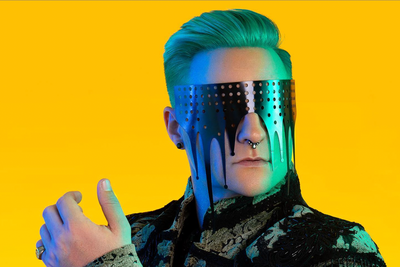On the show that made Blake Lewis famous – American Idol – he was voted second best to winner Jordin Sparks; his debut album, Audio Day Dream, was released to mixed reviews and stalled at fewer than half-a-million copies sold; and at least one romantic interest in his life has let him down not so gently.
But don’t cue the melancholic music just yet.
Because it seems that despite the emotional and creative rollercoaster that has defined his past couple of years, Lewis’ pain is his fans’ gain.
Armed with a new album, Wanderlust Unknown, and a new lease on his personal and professional life, the beatboxing wunderkind returns with an organic, unapologetic record that, well, sets the record straight.
Its message? Lewis is nobody’s doormat. And that goes double for you, Clive Davis.
It’s been a few years since you first appeared on “American Idol” – what’s your take on the show now that you’re an alumnus?

BLAKE LEWIS: It’s kind of surreal now. It’s a great, quality show that America loves. It’s fun looking back at it now. I never watched it. I’ll watch some of the episodes now, and I went and saw three shows live. That was a trip.
Your debut album, “Audio Day Dream,” received mixed reviews when it was released, and in an interview you once said that you “learned a lot since then.” What did you mean by that?
BL: By recording in a way that I did. I was constantly on tour. I worked with some amazing producers and I’m a producer myself. I learned a lot of tricks of the trade. Some are great vocal producers, some aren’t. I learned a lot technically. Learned a lot about a major label. Big eye-opener. I knew I had to step up the game immediately.
BL: It’s a completely different record. My melodic sensibility is different. This is a dance-indie-pop record; I kinda describe it as that. It’s very progressive. Great for driving, working out, for the club. Each track is different and unique and it’s a more personal record. It’s about a relationship about a woman I was in love with and also the record industry that’s eating itself up.
Looking back on “ADD,” and with “Heartbreak” under your belt, do you feel that [your former label] Arista held a lot of the creative control?
BL: I never wanted to be with a major label. I was already signed coming out of “American Idol.” I was forced into that position, but I made the best of it.
How much influence did Clive Davis have on the song selection of “ADD”?
BL: He passed on “How Many Words,” a song that I was really excited about. He tested it. It was the highest tested song on the record. He apologized. I was right, he was wrong. I was really upset. Business people should stay out of the creative process. Especially older ones who are hard of hearing.
Since your stint on “American Idol,” you’ve been privy to some pretty cool experiences – like getting First Lady Michelle Obama to beatbox at the Congressional Clubs’ First Lady’s Luncheon. What else has happened to you in your rise to fame, where you’ve been, like, ‘Wow, this is awesome’?
BL: There have been many amazing opportunities and collaborations. Michelle was definitely on the top. It was pretty amazing singing in front of 1,000 women of Congress. I taught them all how to beatbox. I was honored to be there.
You’re part of the growing number of people who have participated in Adam Bouska’s NO H8 photo campaign. As someone who identifies as heterosexual, why is championing equal rights for the LGBT community important to you?
BL: Isn’t that the American way? We’re born in a country that’s supposed to be free, yet there are all these policies and rules that allow us not to be. I support my friends who are gay and struggling with issues. If I can help my friends in any way, I will.


